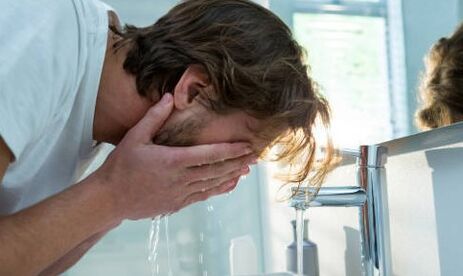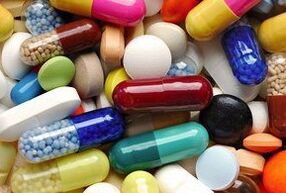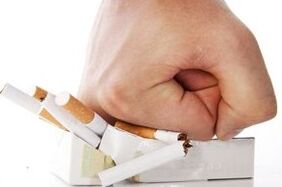Given the characteristics of the gland arrangement in the body and the diagnostic methods of prostatitis, some men ignore dangerous symptoms and are not in a hurry to visit the doctor.Treatment can be very effective if you are not postponing your beginning.

Prostatitis is a urological disease of the prostate gland, which is several inflammatory processes.This disease has 2 forms: acute and chronic.The acute form develops rapidly and, if you do not take action for treatment, it enters the chronic phase.
Signs of acute prostatitis are characteristic of any inflammation.Patients increase at high temperature, goose bumps and fever are observed.Acute acute pain appears in the groin, which extends to the anus.As a result, the processes of emptying the bladder can be painful and difficult.
In chronic prostatitis, the same symptoms are observed as acute, but are less pronounced, sometimes go completely over a short time.
In addition to pain and temperature in the chronic form of the disease, the discharge appears in small volumes that projected the urethra.If you do not take action and do not start treating the disease, the inflammatory process will expand, causing problems with erectile function and pneumonia.When the disease is spreading to the urinary system, diseases such as cystitis and pyelonephritis occur.
If, acutely, people immediately resorted to doctors, with chronic inflammation, men prefer to ignore symptoms and try to be without medical care.This attitude towards your own health is very dangerous, as only the doctor can determine to what extent inflammation has been and prescribe the medicines needed to facilitate well -and avoid serious consequences.
Causes and diagnosis of pathology
The causes of general and chronic prostatitis are the same;Therefore, their diagnosis and treatment are performed in similar ways.
As the prostate gland is in the pelvis, access to it can occur in different ways:
- of the bladder;
- in the urethra;
- of the rectum;
- by lymphatic vessels;
- According to the circulatory system.
In addition to the fact that the disease can occur due to a direct entry of iron infection, there are several factors in which disease development occurs.
The most common among external factors is hypothermia.A long stay in a cold room or sitting on cold surfaces makes the prostate gland less resistant to infections.The harmful consequences for the prostate gland have a sedentary lifestyle and a sitting work, as well as frequent constipation and other disorders in the intestine work.

The consequences of prolonged sexual abstinence and, conversely, excessive sexual activity are equally negative for the prostate gland.The risk of inflammation repeatedly increases any urological and sexually transmitted diseases.
Given that the list of prostatitis factors and pathogens is very extensive, your exact diagnosis is extremely important for effective treatment so you can't do it without going to the doctor.
The main diagnosis of prostatitis is a rectal examination of the prostate gland and secret for analysis.This will help determine the main pathogen.
In addition to the prostate gland research, it is necessary to establish how widely the infection has spread.For this, urine and blood tests are performed and ultrasound is prescribed.If necessary, a complete urological examination and radiological diagnosis is performed.
Having received a complete image of the development of inflammation and revealing the pathogen of the infection, you can decide on the treatment process.As the treatment of prostatitis depends on conditions and is very individual, only a qualified doctor should determine which anti -inflammatory drugs and additional procedures to treat the disease.
Antibacterial agents
Effective treatment of prostatitis in men, medications, massage and physical therapy should be prescribed and controlled by experts to avoid side effects and the appearance of forms of resistant infection.
The properly selected treatment of men will help get rid of the acute form of prostatitis relatively quickly and translate chronic form into long -term remission.
Because prostatitis is the result of the action of the infection, you cannot do without antibacterial therapy during your treatment.Anti -inflammatory drugs are prescribed only after obtaining the results of all tests.Even incorrectly selected effective medicine or an inappropriate dosage can lead to the fact that the causative agent of the disease will become much more stable and will become much more difficult to heal it.
Antibacterial medications for the treatment of prostatitis are antibiotics of various groups.Antibiotics can be in the form of tablets and in the form of intramuscular infections.Before prescribing antibacterial drugs for the prostate, the body is necessarily tested for the sensitivity to them.Thanks to this, you can choose the most effective medicine for each individual case and avoid the appearance of allergic reactions.
The prescribed antibiotics course is 10 to 14 days, during which alcohol is strictly prohibited.At the end of the course, repeated tests of the prostate secret are performed.If there is still an infection, the course of antibiotic tablets and injections will be extended for another week.

Complex therapy in chronic form
In the treatment of chronic prostatitis, not only antibiotics, but also other medications are used.Complex therapy includes support drugs, anti -inflammatory and antispasmodic for the gland and vitamins.
Relatively recently, immunomodulators began to include complex therapy, which give a good result to avoid exacerbations of the disease.Thanks to him, many patients decrease painful sensations, an erection is restored.
With complex treatment of prostatitis, medications can use rectal suppositories, candles.Chronic inflammation at the exacerbation stage of the candle with the purpose and the candle with the prostate gland peptides is well facilitated.Suppositories help increase the stage of remission, normalize urination and reduce pain.
In addition to effective medicinal products of prostatitis, physiotherapeutic procedures can be prescribed by a doctor.They increase the effectiveness of antibiotics and other medications and improve blood circulation in the pelvis.
Among the physiotherapeutic procedures, the most effective in the treatment of prostatitis are electrophoresis, magnitophones, laser therapy and impulse currents.All of these procedures are performed using special devices that direct the therapeutic effect to the problem area.
In addition to drugs and procedures for more effective treatment, a diet is prescribed, whose main task is to reduce salt consumption and other substances irritating the prostate.Salt, canned foods, canned foods, fatty and fried foods, SD, soda and alcoholic beverages should be excluded from nutrition.In the remission phase, it is allowed to weaken a strict diet.
Therapeutic and preventive massage
Prostate massage is very effective in both treatment and prevention, although it may cause moral and physical discomfort.It is for this discomfort that many men avoid this procedure.But it is the massage that is the best tool for restoring the health of the gland.
Since during prostate massage, a large amount of secret is released from it, which is excreted through the urethra, it is against -it is intended in acute and chronic prostatitis in the acute phase.In fact, in these cases, along with the secret, the source of infection is distinguished, and there is a risk of its propagation throughout the body.
If you refuse to massage the prostate, the treatment of the chronic form of the disease will be ineffective, even if the doctor can choose the best medicine for treatment.Therefore, you should not abandon the unpleasant procedure.
Thanks to massage, blood circulation improves, muscle tone increases, which allows drugs to affect the area of the problem more effectively and punctually.The prostate gland is a unique organ in the human body, the physical effect on which it contributes to its recovery.
It is better to perform the procedure for a professional doctor every 2 days.40 minutes before the procedure, you should drink a liter of water or juice to ensure bladder filling.The impact on the prostate should be at least 30 seconds.At the same time, weak pains may occur that will have to bear.If intense pain occurs, the procedure should be interrupted.

In addition to the direct massage of the prostate, the doctor may recommend the patient to perform the groin massage according to a special method.If a visit to a specialist's medical massage is completely impossible for any reason, you can resort to Hydro Massage at home.
Folkloric methods
In folk medicine, there are several ways to treat prostatitis.But you should not consult their help without consulting a doctor.The prostate is an important and delicate organ.And only the doctor, based on the results of the analysis, can prescribe effective treatment.
A very popular popular remedy is pumpkin seeds.They are rich in zinc, which are in them in a convenient way for assimilation.This substance is necessary for the normal functioning of the prostate gland;Therefore, moderate use of pumpkin seeds (no more than 30 pieces per day) can have a positive effect.
Inclusion in your diet of fresh vitamin A, phosphorus and potassium rich asparagus will be favorable.Asparagus may not only be consumed, but also produce juice, which provides visible results if you drink it every day in volumes of at least 600 milliliters.It will be useful to add carrot, beet or cucumber juices to the juice.To make the drink really effective, you should cook it from fresh products.
It is rich in useful vitamins and minerals in parsley;Therefore, with prostatitis, it is extremely useful.Fresh parsley juice is especially useful, which should be taken three times a day half an hour before meals for 1 tablespoon.l.
Very useful for prostatitis, honey and purposes.They can be consumed both foods, as well as a variety of beverages based on them.Given that most folkloric methods include the use of body -rich products for the body, official medicine has nothing against them.The main thing is that popular remedies do not replace drug treatment, but complement it.


































